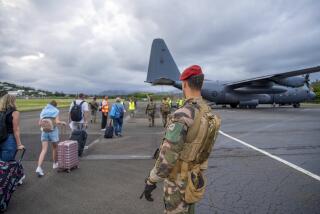Rural French Outnumbered 2 to 1 : Ethnic War Stalks Settlers in New Caledonia’s Bush
- Share via
VOH, New Caledonia — Marcel Chevalier no longer works in his vegetable garden these days.
“Snipers,” Chevalier explained with a snarl, narrowing his eyes and rubbing the sparse white stubble on his chin.
At 71, Chevalier, is a deer hunter and an expert marksman, and local residents say his aim is still sharp enough to hit the head of a chicken at 100 yards.
But now no one dares hunt out here in the New Caledonian bush.
“The tribes will kill you as soon as look at you, if for no other reason than to get that old gun of mine,” Chevalier said, referring to the decades-old Springfield rifle he carries.
Now Chevalier sits, from morning till night, on the big root that sticks out beneath the flame tree in front of his two-room house, gazing sadly at the 26 acres of range land, forest, mountains and waterfalls that he has called home his whole life.
He keeps the Springfield and a 16-gauge shotgun at his side at all times. Like thousands of other European settlers in this French territory, he considers his guns to be all that stand between him and the militant native separatists who have plunged New Caledonia into crisis.
It is a struggle that endures despite the violent end Thursday of a 13-day hostage drama triggered by the separatist struggle and the rescue of 23 Frenchmen abducted last month. The operation cost the lives of 19 Melanesians and two French soldiers.
As expected, the operation touched off a spate of separatist threats to step up their armed campaign for independence. The separatists’ radical leaders, some of whom were trained in Libya, have called on their followers to intensify the fight to drive out the settlers.
The Melanesians, or Kanaks, as they are called, are in the minority but are strongly driven by devotion to their land, which they contend was stolen from them by the French settlers.
Outnumbered by Kanaks
Only in Noumea, the territory’s principal city located 150 miles southeast of Voh, do the white colonists outnumber the native Kanaks. In the rugged outback the settlers are a minority, in places like Voh outnumbered 2 to 1 by Melanesians.
Among the lush green mountains and clay-banked rivers of what Caledonians call la brusse --the bush--many French settlers feel that the war has just begun.
It is a land of roughneck cowboys, known as caldoche , hard-working, hard-drinking men whose wives can shoot as well as they cook. But the romantic dream of prosperity in a new land has collided with the reality of growing ethnic friction, for the Europeans’ cattle spreads rub dangerously against the ancestral lands of a newly militant generation of young natives.
“This is just like the Wild West in the 1800s in America,” France de Bien, 44, a third-generation New Caledonian, told a visitor recently. “The only big difference, of course, is that this isn’t the 1800s. It is 1988, and these radical Kanaks have traveled outside the village, outside the territory. They have studied in Libya and in France. And they have learned how not to compromise.
“What they must realize,” he added, “is that we will not compromise either. We will kill and be killed before we leave our land.”
Slow Development Criticized
De Bien is a bush cowboy, but he is also a politician, Voh’s local representative in the dominant right-wing political party. The party is controlled by a handful of Noumea-based families, and many settlers criticize it for holding back development in the bush.
Most of the bush settlers blame the lack of rural development for leaving them outnumbered and virtually unprotected.
“The fat-cat families who hold the political power in Noumea don’t want to share what little business there is in New Caledonia, so they turn down all our requests to build up the bush,” said a cafe owner who has been waiting for more than a year for a license to open a hotel in Voh, which now has no such facility.
Despite almost 150 years of French rule, there is virtually no industry in the bush, nothing to draw new colonists. The territory’s economy has been based on vast nickel reserves, among the largest such deposits in the world. New Caledonia is the world’s No. 3 producer of nickel ore, but about 10 years ago, when international nickel prices plummeted, many of its mines closed and thousands were thrown out of work.
Nothing has taken nickel’s place. There are no canning factories for New Caledonia’s farm produce, no export markets.
“We can grow a tomato 6 inches across,” one farmer said, “but with no market, why bother?”
Turning to Tourism
Increasingly the lush island territory is turning to tourism to support its 145,000 people, about 85,000 of whom are white or mixed-blood Polynesian settlers.
“In Noumea, there are maybe six or seven big beach resorts,” Joseph de Bien, the cowboy-politician’s brother, said. “In the bush, there is almost nothing.”
Voh’s cafe owner said, “And now, with all the separatist trouble, the few tourist hotels that do exist have been commandeered by the French army.”
Three young men were seated in the cafe, two cowboys and an unemployed welder, and they nodded agreement.
“The fat cats in Noumea are just letting the bush go to hell,” the welder said, “and us along with it. No jobs, no development, no more pioneers. Eventually, we’ll all be shot in the back by the Kanaks, and the fat cats will go back to France.”
But for most of the cowboys, they said, leaving is not an option. New Caledonia is all they know, all their parents and grandparents knew. To them it is as much home as it is to the Kanaks.
Father Was a Pioneer
Few people illustrate this better than Chevalier, the old hunter. His father was an early pioneer, striking out from Paris as a teen-ager before the turn of the century, boarding a steamship for the South Pacific and the exotic promise it held.
For decades Chevalier’s father lived in peace with the Melanesian tribesmen, whose village of thatched huts a mile or so from the house has changed little over the years. Chevalier grew up with the villagers, went to school with them. They even permitted him to enter their sacred tribal places.
“I guess it all changed just a few years back,” he recalled over a glass of Australian whiskey, “back with the last round of trouble between the Kanaks and the caldoche in ’84 and ’85.
“I guess it was three years ago the Kanaks first attacked the house. I fought them off, but they came back when I was gone, broke out all the windows and stole everything they could. It’s this younger generation. I don’t know them, but I’m sure they were after my guns. I take them with me everywhere now.”
Asked whether he thinks the situation will get worse, he said it probably will, and other settlers agreed.
Joseph de Bien said: “I’m afraid we’ve got no choice but to fight when the time comes. It is only a matter of how hard, and when.”
De Bien was asked where he will go if the Kanaks manage to achieve independence and expel the French. He smiled with resignation, pointed a gnarled finger at the ground and replied: “Six feet under, I suppose.”
More to Read
Sign up for Essential California
The most important California stories and recommendations in your inbox every morning.
You may occasionally receive promotional content from the Los Angeles Times.













